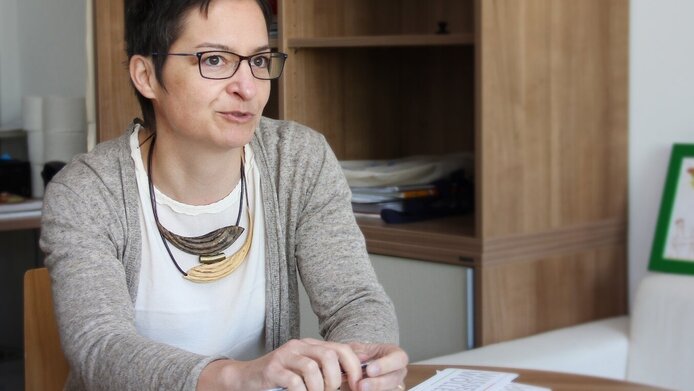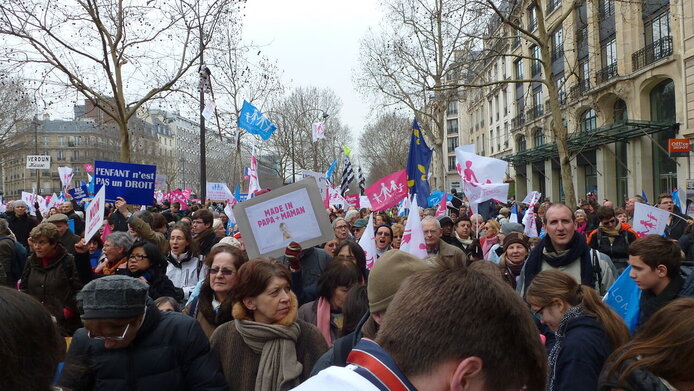“Conflicts over values polarise enormously”

FWF: You have made the Russian Orthodox Church your test case for investigating the impact of religion on social and political life. Why the focus on Russia? Kristina Stoeckl: I studied comparative literature, German and Russian in Innsbruck. When you study Russian philosophy, you simply cannot avoid looking into the philosophy of religion. I became interested in this topic and then wrote my thesis about religious dissidents in the late Soviet period. My book about the human rights debate in the Russian Orthodox Church was finally published in 2014. The issue had gained importance in 2008, when the Russian Orthodox Church published a document on human dignity, freedom and rights. Such a statement was a novel occurrence in the Orthodox world. I therefore investigated from where this change had originated. This was the point of departure for my current research focus on post-secular conflicts. I developed this notion from the post-secular society described by Jürgen Habermas, whereby religion is not excluded from public debate but is understood to be a resource for values. FWF: What motivated the Russian Orthodox Church to deal with human rights? Stoeckl: The current patriarch, Kirill, who focuses very much on external relations, was elected in 2009. In 2012, Putin was confirmed in office for the third time. This was the time when the conservative turnaround based on “traditional values” was taking place in Russia. The Russian Orthodox Church has exploited this political momentum and is now doing something the Christian right in America have been doing for a long time: it is using secular arguments for religious issues and trying to translate its own concerns into laws. This is happening in the debate on abortion, for instance, regarding the right to life or the right of refusal by third parties on moral grounds (e.g. medical staff who conduct abortions, or even the taxpayer, whose taxes are used – as is the case in Russia right now – to help finance abortions in the public health system). Translating a religious issue into secular legal language does not lead to more consensus in the Habermasian sense, but to more conflict. FWF: What is the role of the relationship between politics and church in all this?
Stoeckl: Both political and religious forces currently perceive a chance to uphold their values. At the same time, they also feel threatened by international legal instruments used by institutions such as the European Court of Human Rights, the Council of Europe or the United Nations. Hence, they seek to defend the national legal framework by weakening international instruments. Another intention of conservative forces is to present themselves as the opposite pole to liberal order. This is where Russian politics come into play, with the intention of positioning the country globally as a counter-pole to the West. While it is not surprising that the church champions such moral conservative ideas, they have now become part of Russian foreign policy. I don’t think this intertwining of politics and religion is going to last, however. It is a western fallacy to believe that everything in Russia happens the way the Kremlin or Putin want it to happen. Religious groups have their own autonomy. FWF: Since the beginning of your investigations, the issue has become both more current and more complex. Today, there are coalitions for traditional values across national and denominational boundaries. How does this transnational networking work? Stoeckl: Penetrating international institutions, e.g. by obtaining accreditation as an NGO or by influencing active diplomats, is one thing. The polarisation of values at the level of civil society is another, and something that can be clearly observed. Conservative groups increasingly engage in networking and making their voices heard when it comes to issues such as family, abortion and religious freedom. In 2013, when the introduction of same-sex marriage was debated in France, the entire Christian right in Europe and America got involved and commented on it. The Patriarch of Moscow also published a declaration of support. The Christian right was certainly not the first to create NGOs for networking and lobbying, but we are increasingly seeing them act as professional norm entrepreneurs. FWF: And Russia is playing a greater role again in this global context? Stoeckl: That’s right. Until 2012, Russia was not particularly active, but since then entrepreneurs close to Putin have been increasing their financial support to religious players. These resources can be used, among other things, to organise transnational conferences such as the World Congress of Families. This is an internationally active NGO founded in 1997 by a Russian and an American. In this way, certain groups within the Orthodox Church now find it easier to engage in transnational networking. FWF: What is the impact of this polarisation of values on Europe?
Stoeckl: It is leading to a rift in civil society, because conflicts over values cause a substantial degree of polarisation. As a consequence, the norms of our social life are being placed under scrutiny. We are currently experiencing a massive social activation of the right, which is deliberately designing alternative narratives. The aim of our research is to understand the mechanisms underlying this polarisation. A surprising first insight for me is that there has been a kind of ideological West-East reversal. Issues that were rejected under communism at the time, such as the suppression of religion, international solidarity, etc., are now being transferred to Brussels. This makes it easier to understand the way some countries, Hungary or Poland, for example, are acting. The right is even calling the West a secular dictatorship. The ideological history of the 20th century is being rewritten here.
FWF: How can liberal democracies respond? Stoeckl: Let’s take the example of Austria and Germany, where religious discourse is still very much in the hands of the churches and not in those of radical grassroots movements. In my opinion, that’s a good thing. There is a level playing field for institutional discourse. Another important aspect is how the political system deals with certain issues. In Germany, the debate about same-sex marriage was initially very lengthy, but was finally settled within two weeks, and the law introducing marriage for everyone was passed. The fact that Chancellor Merkel voted against it in the public vote did not trigger much of a reaction. It is important for liberal systems to tolerate diverging positions. And there are political solutions to avoid polarisation. But there also needs to be the will to implement these solutions. FWF: Does the “struggle for traditional values”, as the Russian Orthodox Church puts it, harbour conflict potential for science and research? Stoeckl: Speaking about Russia, it is my impression that the talk about “traditional values” is mainly a political phenomenon. Although the traditional discourse about values is an en vogue topic that also makes itself felt in science, it certainly cannot stop critical sociological research. Russian scientists are under great pressure to publish in Western journals. As a peer reviewer I try to help young scholars meet international standards so they can have a readership in the West. If these young researchers continue to be frustrated, at some point they will no longer publish for the West and that would be disastrous. FWF: Do you cooperate with Russian partners as part of your research?
Stoeckl: Since working on my thesis, I have been able to build up a good network. I have conducted numerous interviews with Russian players from moral conservative circles and also have access to representatives of the Moscow Patriarchate. Our team, which also includes a Russian sociologist, is currently interviewing even more people from these groups, including some from Europe and America. We are trying to get very close and understand who these people are, where they stand, how powerful they are and who they talk to. So far our studies have shown that we are dealing with individual players who are active and visible at a transnational level, but are often hardly noticed within their own church hierarchy. In addition, various groups are also competing with each other for resources and influence. FWF: You have recently been awarded two generously endowed research grants from the FWF and the European Research Council. The phase from doctorate to postdoc is difficult for many. How was it for you? Stoeckl: I had a very precarious postdoc phase. It was during that time that I made the move from humanities to social sciences. But I was lucky enough to receive various grants that also took me abroad. In retrospect I consider it to be a positive thing that I did not have a precarious, compromising post at the university, but was instead able to raise third-party funds and pursue my own research. Nevertheless, the pressure was tremendous. Now the awards have changed everything. Suddenly, academic life is no longer precarious. I still can’t quite believe it.
FWF: Is there a secret of success? Stoeckl: That’s actually something that’s impossible to plan. In Austria, job prospects at universities are not great, but the funding situation is quite good. Postdoc programmes are particularly important. In retrospect, it was beneficial for me to stick to my subject of Russian Orthodoxy at a time when everybody kept saying: “If you want to do religion and politics you should go for Islam.” I didn’t feel competent to do that, though. Doing your own thing very early on requires a lot of courage, but it can be worth it. In my view, the university research arena, which is still very much controlled by the professors, often distracts people from pursuing their own goals and strengths. The experience of doing research abroad has also opened my eyes. In Florence, for instance, I met many people who had received ERC grants, and this has grown into a network of contacts and role models. This would not have been possible in the same way in Austria.
Kristina Stoeckl is an Associate Professor at the University of Innsbruck’s Department of Sociology. As a sociologist of religion, she focuses on the influence of religions on politics and society, specifically with regard to the Russian Orthodox Church. Stoeckl acquired her PhD at the European University Institute in Florence and research grants included a Marie-Curie Fellowship from the University of Rome Tor Vergata and an APART grant from the Austrian Academy of Sciences. In 2015, she received the START grant for outstanding young researchers from the Austrian Science Fund FWF and the ERC Starting Grant from the European Research Council for her research project on post-secular conflicts.
Further reading






